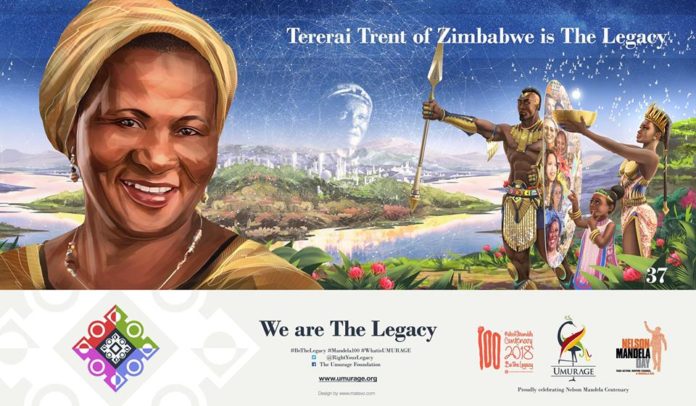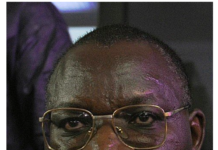Imagine you grew up in a cattle-herding family in austral Africa. Imagine you did not have the opportunity to go to school, just because you were a girl. Imagine you were so determined, you taught yourself how to read and write from your brother’s schoolbooks. Imagine you were married young and had three children by the time you were eighteen. Would you just give up your dreams and accept the secondary place society gave you? Or would you keep believing that your life could still change despite all?
Today I am inspired by Tererai Trent of Zimbabwe. Tererai was born in 1965 in the village of Zvipani in Mashonaland West Province in Zimbabwe. In those days, Zimbabwe was still a British colony and was called Rhodesia.
“The British colonized Zimbabwe in 1888, and communities like ours were forcibly resettled from our ancestral homes to this incommodious territory when the harsh terrain was determined to be unsuitable for European colonists.
Demarcated by the European settlers as a “native” reserve in 1913, Hurungwe became one of the largest and poorest African Reserves in Zimbabwe. Today it is known as the Mosquito and Tsetse Fly Belt. Our village has struggled with disease, poverty, and a lack of basic resources—clean water, electricity, health care, education, and at times, food—for decades.”
As it was the case for most girls in those days (and even today), Tererai could not go to school. The family had opted to educate their son Tinashe while Tererai stayed home, helping her mother with different chores and taking care of the family’s cattle.
The little girl envied her brother for being allowed to go to school. While the girl dreamed to get an education, her brother showed little interest in learning anything. One day, she decided to start teaching herself how to read and count. She would borrow her brother’s schoolbooks and go through them as she was watching the cows.
The young girl did not stop at borrowing her brother’s books: she started doing his homework, to the great pleasure of her sibling who was very happy to hand them in as his own.
However, the teacher was suspicious when he saw how the quality of Tinashe’s homework had so drastically improved, and when he figured out it was the work of little Tererai, he tried to get her parents to bring her to school as well.
Her father reluctantly gave in and Tererai was allowed to attend school, but that did not last long. In those days, the Zimbabwe War of Liberation, which had erupted a year before her birth, had practically enflamed the whole country including her village.
Tererai remembers it as time of division for her people, with some of the men joining the rebellion while others opted to fight for the colonizer.
Women and girls were the most exposed to exactions.
“While all women and girls were in danger of sexual violence as soldiers passed through their homesteads, unmarried young women and girls were the most vulnerable. Rather than have their daughters sexually abused, fathers and clan leaders forced very young women into marriages as a kind of protection”, she wrote in her book, ‘The Awakened Woman’.
Her father gave her 11 years old daughter in marriage to an older man. Her husband was a very abusive man, and Tererai found herself trapped in the same life of misery her mother and aunts did before her. The first thing her husband did was to bar her from reading. He would beat her whenever he caught her practicing her reading!
“It was within this milieu that I, hardly fourteen years of age, had my first child. By eighteen years of age, I had birthed four.”
“I come from a long line of women who were forced into a life they never defined for themselves. I had lived my whole life in a poor rural village and had seen how poverty and a lack of education deeply entrenched women in a life of servitude and took away their self-esteem.”
Tererai found strength from the other women around her.
“Despite my own early and abusive marriage, the determination and brilliance of the women around me, who moved through life with stoicism despite the hardships they faced, planted a seed that stirred a deep hunger in me for a different life. Yet it was not that easy to change my life.”
It seems that her fate was sealed and to fool herself into believing she could extricate that living prison? Not so fast! We are in the month of women who dared to dream, aren’t we?
When she was about 17 years old, with no diploma and no future, Tererai met a humanitarian woman who changed her life with a few simple words:
“If you believe in your dreams, they are achievable.”
The woman’s name was Jo Luck. Tererai was going to see her again several years later under completely different circumstances!
With this inspiration and her own mother’s encouragement, Tererai wrote down her dreams: going to America, pursuing a higher education, and becoming a Doctor. She sealed the piece of paper in a tin can and buried it under a rock. Little did she know that she would realise all of her dreams and much more.
In 1998, her husband moved the family to Oklahoma, in the US. She decided to take correspondence classes without her husband knowing and began saving money. When she felt confident enough in her own abilities, she applied for school and was admitted to Oklahoma State University. There wasn’t anything her husband could do about it, they were in the US and she was not gonna let him stand in the way of her dreams anymore.
In 2001, this mother of five children earned a bachelor’s degree in agricultural education, and two years later, her master’s degree.
“I can’t talk about my children’s education when I’m not educated myself. If I educate myself, then I can educate my children.”
Her abusive husband was deported, and she stayed in the US and continued her education. In December 2009, she earned a doctorate from Western Michigan University. After she earned each degree, Dr Tererai Trent returned to Zimbabwe, unearthed her tin and checked off each goal she accomplished, one by one. She had realised all her dreams!
Imagine that Oprah Winfrey heard of her story and invited her on her famous Oprah Winfrey show! The Television mogul would later describe the Zimbabwean scholar as her all-times favourite guest. And guess who Oprah reunite with Tererai? Jo Luck, the humanitarian woman who had changed her life by a few words of encouragements when she was going through some of the most difficult times of her life.
When she created her Foundation, the Tinogona Foundation (‘Tinogoma’ means ‘it’s achievable’), an organisation aiming at providing universal access to quality education to children regardless of their gender or backgrounds, Oprah immediately donated $1.5 million so Dr Trent could build her own school in her old village in Zimbabwe. Matau Primary School was completed in 2014, with multiple classrooms serving thousands of students. As you guessed it, girls are in high attendance now, when there was almist none when she was their age.
To this date, her Foundation has built eleven schools in Zimbabwe and has helped more than 5,000 children attend school.
In 2015, Dr Tererai Trent published a children’s book about her own life called The Girl who Buried her Dreams in a Can. In 2017, she published ‘The Awakened Woman – Remembering & Reigniting Our Sacred Dreams’, where she shares the lessons she’s learned along her unique journey and calls for women to awaken their heart and find their own path in life. The books foreword was written by no other than Oprah Winfrey. The book won the 2018 NAACP Award for Outstanding Literary Work.
Dr. Trent was awarded several Honorary Degrees including an Honorary Doctorate of Science from the University of Massachusetts and an Honorary Doctorate in Women & Gender Development from the Women’s University of Zimbabwe in 2013, and an Honorary Doctorate of Human Letters from Oklahoma State University and an Honorary Doctorate of Science from Loyola University Chicago in 2014.
Actually, I have to make a small correction: Tererai Trent is now Professor Trent. The Zimbabwe born scientist is currently an adjunct professor in Global Health at Drexel University in Pennsylvania. She was since remarried to Mark Trent, a plant pathologist whom she met at Oklahoma State University.
Right Your Legacy, Professor Tererai! You are the livingproof that dreams are ACHIEVABLE!
Contributor
Um’Khonde Habamenshi
































































